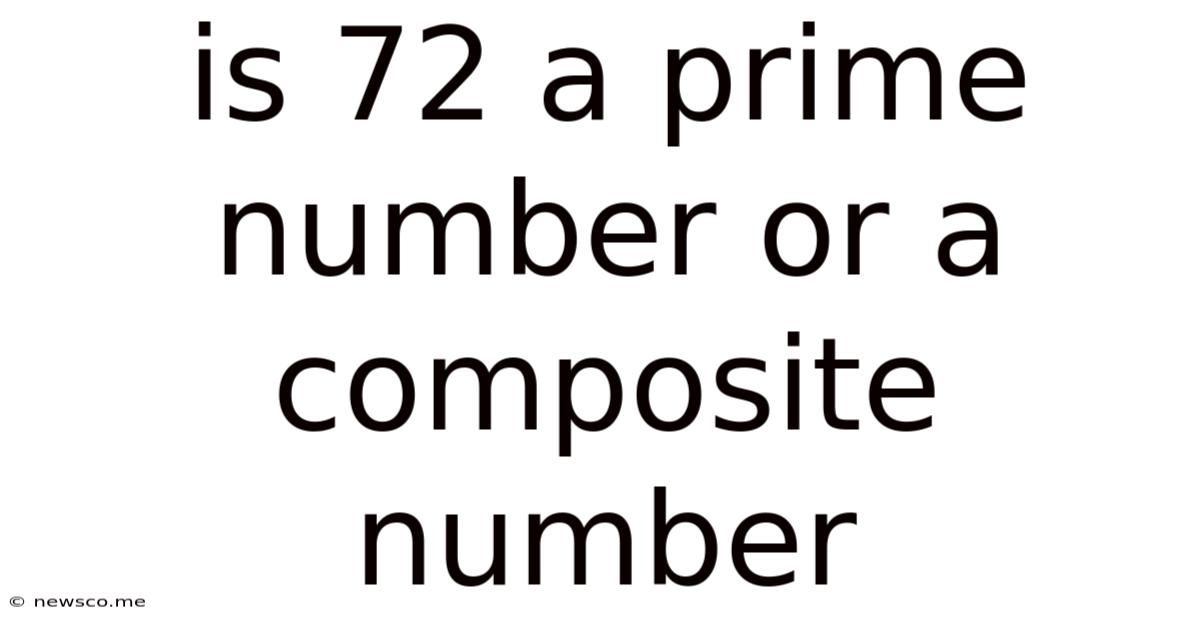Is 72 A Prime Number Or A Composite Number
News Co
Mar 16, 2025 · 5 min read

Table of Contents
Is 72 a Prime Number or a Composite Number? A Deep Dive into Number Theory
Determining whether a number is prime or composite is a fundamental concept in number theory. This article will thoroughly explore the question: Is 72 a prime number or a composite number? We'll delve into the definitions, explore the properties of prime and composite numbers, and provide a step-by-step process to classify 72. Furthermore, we'll explore related concepts to enhance your understanding of number theory.
Understanding Prime and Composite Numbers
Before we classify 72, let's solidify our understanding of prime and composite numbers.
What is a Prime Number?
A prime number is a natural number greater than 1 that has only two distinct positive divisors: 1 and itself. This means it's not divisible by any other number without leaving a remainder. Examples of prime numbers include 2, 3, 5, 7, 11, 13, and so on. The number 1 is neither prime nor composite.
What is a Composite Number?
A composite number is a natural number greater than 1 that is not a prime number. This means it has at least one divisor other than 1 and itself. In other words, it can be factored into smaller whole numbers. Examples of composite numbers are 4, 6, 8, 9, 10, 12, and so on.
Classifying the Number 72
Now, let's apply our knowledge to determine whether 72 is a prime or composite number.
To determine if 72 is prime or composite, we need to check if it's divisible by any whole number other than 1 and itself. One efficient method is to check for divisibility by prime numbers. We can start with the smallest prime number, 2.
- Divisibility by 2: 72 is an even number, meaning it's divisible by 2 (72 ÷ 2 = 36).
Since 72 is divisible by 2, a number other than 1 and itself, we can immediately conclude that:
72 is a composite number.
We don't need to check for divisibility by other prime numbers (3, 5, 7, etc.) once we've found a divisor other than 1 and 72. The presence of even one such divisor is sufficient to classify it as a composite number.
Factorization of 72
Understanding the factors of 72 further reinforces its composite nature. Let's find its prime factorization.
We can use a factor tree to break down 72 into its prime factors:
72 = 2 x 36 36 = 2 x 18 18 = 2 x 9 9 = 3 x 3
Therefore, the prime factorization of 72 is 2 x 2 x 2 x 3 x 3, or 2³ x 3². This clearly shows that 72 is a product of smaller prime numbers, confirming its composite nature.
Exploring Related Concepts in Number Theory
Let's broaden our understanding by exploring some related concepts in number theory:
1. Divisibility Rules
Divisibility rules are shortcuts to determine if a number is divisible by another number without performing long division. Knowing these rules can significantly speed up the process of classifying numbers as prime or composite.
- Divisibility by 2: A number is divisible by 2 if its last digit is 0, 2, 4, 6, or 8.
- Divisibility by 3: A number is divisible by 3 if the sum of its digits is divisible by 3.
- Divisibility by 5: A number is divisible by 5 if its last digit is 0 or 5.
- Divisibility by 9: A number is divisible by 9 if the sum of its digits is divisible by 9.
- Divisibility by 11: Alternately add and subtract the digits. If the result is divisible by 11, the number is divisible by 11.
2. Greatest Common Divisor (GCD) and Least Common Multiple (LCM)
The GCD is the largest number that divides two or more numbers without leaving a remainder. The LCM is the smallest number that is a multiple of two or more numbers. These concepts are crucial in various mathematical applications.
For example, let's find the GCD and LCM of 72 and 36:
-
GCD(72, 36): The factors of 72 are 1, 2, 3, 4, 6, 8, 9, 12, 18, 24, 36, 72. The factors of 36 are 1, 2, 3, 4, 6, 9, 12, 18, 36. The greatest common factor is 36.
-
LCM(72, 36): The multiples of 72 are 72, 144, 216... The multiples of 36 are 36, 72, 108... The least common multiple is 72.
3. Sieve of Eratosthenes
The Sieve of Eratosthenes is an ancient algorithm for finding all prime numbers up to a specified integer. It's a simple yet effective method for identifying prime numbers within a given range.
4. Prime Number Theorem
The Prime Number Theorem is a sophisticated result in number theory that describes the asymptotic distribution of prime numbers. It provides an approximation of the number of primes less than a given number.
Conclusion
In conclusion, 72 is definitively a composite number. Its divisibility by 2, and its prime factorization (2³ x 3²) clearly demonstrate this. Understanding the concepts of prime and composite numbers, along with related topics like divisibility rules, GCD, LCM, and the Sieve of Eratosthenes, provides a strong foundation in number theory. These concepts are essential not only for mathematical understanding but also for various applications in computer science, cryptography, and other fields. The journey of exploring numbers, from simple classification to complex theorems, reveals the fascinating depth and elegance of mathematics.
Latest Posts
Related Post
Thank you for visiting our website which covers about Is 72 A Prime Number Or A Composite Number . We hope the information provided has been useful to you. Feel free to contact us if you have any questions or need further assistance. See you next time and don't miss to bookmark.